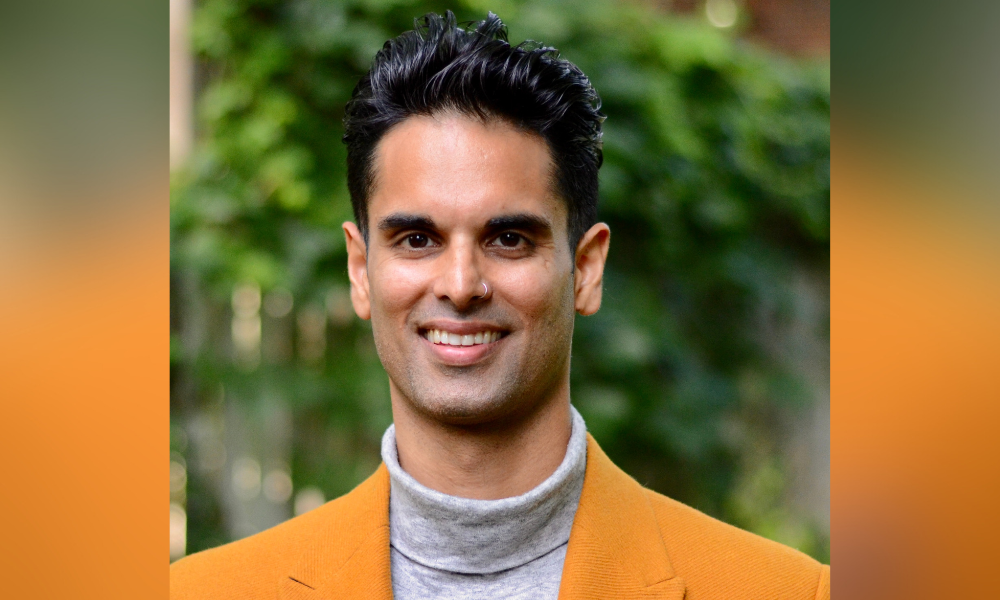
Clinic aims to equip students with anti-oppressive, trauma-informed skillset, says Khalid Janmohamed

The Lincoln Alexander School of Law at Toronto Metropolitan University has launched a student legal clinic.
The cohort of eight second-year students will tackle files dealing with housing and social assistance matters. They will also undertake community-based projects and advocacy work. On housing, students will assist tenants facing eviction or advocate for those whose landlord is not properly maintaining their home. On the social assistance side, their work will include helping people living with disabilities to appeal the denial of their Ontario Disability Support Program benefits. To facilitate a community-oriented learning approach, the legal clinic’s students will also work collectively with community groups and associations on broader, more systemic legal issues.
Khalid Janmohamed, director of legal clinic programs, says that while it’s crucial that students work on individual client cases, which often concern “really dire circumstances,” broader community work is also essential because these legal issues are “deeply rooted” in the surrounding systems, legal and otherwise.
“In addition to doing that individual client work, it's important to do some of that more systemic community-rooted work to address both the individual issues and these broader systemic societal issues,” says Janmohamed.
“To do that, it takes time to build relationships with communities, to build trust,” he says. “A lot of these communities have already been doing work on these issues. They've been doing a lot of organizing – they already have power around these things. So, it's about learning how we can support them.”
Janmohamed began his career practising civil litigation at Paliare Roland Rosenberg Rothstein and Adair Barristers. Then he spent six years working at the HIV & AIDS Legal Clinic Ontario, as a staff lawyer and then as director of litigation services.
The clinic will begin taking on clients in mid-October. It will not be open to the public for calls or walk-ins but will receive referrals from a local community legal clinic called Neighbourhood Legal Services. As part of its establishment, the clinic executed a “needs assessment” for the communities surrounding Toronto Metropolitan University in the city’s downtown core.
“In terms of the communities we'll be working within the area around us, over half of the population around us identify as racialized,” says Janmohamed. “There are substantial Indigenous populations and 2SLGBTQ+ communities, lots of folks living with disabilities, and folks who are houseless or precariously housed.”
The clinic found that the unmet legal needs prevalent among these communities include housing, social assistance – particularly social assistance tied to disability – criminal-law related issues, and immigration and refugee work.
Janmohamed says the program was in the unique position of being able to build a legal clinic from scratch. Most of the others in the city have been around for decades. Lincoln Alexander’s clinic has been working closely with the others to learn what they do. While it will incorporate what they have learned from other clinics, he says they also want to “build on that and do some things differently and innovatively.”
There are three prongs to their innovative approach.
One, the clinic is developing an anti-oppressive and trauma-informed practice. Two, they will reimagine how to engage with legal systems and interrogate those systems and lawyers’ roles within them. Third, the clinic will have a “slower, more reflective, more intentional legal practice,” says Janmohamed.
Their approach is rooted in the clinic’s goal to work with communities and among each other more holistically, more collaboratively, less hierarchically, and in a way that is “deeply empathetic and responsive” to the needs and experiences of those with whom they will be working, he says.
Part of what an anti-oppressive practice looks like is a focus on how traditional legal practice can involve assumptions or biases about the capacities of clients, how involved the client should be in the case, or what their goal should be, says Janmohamed. Because clients who use legal clinics have often had negative or oppressive experiences with authority figures, the experience of working with a lawyer can perpetuate that oppression, he says.
“We'll be equipping students with those skills and the understanding to avoid being another site of oppression for clients. It also means infusing our work with decolonial and anti-racist ways of thinking and working and with an understanding of other movements that are that are relevant to our work – like disability justice, queer and gender justice movements.”
Janmohamed says that a principal aspect of the students’ trauma-informed training is the recognition that the clinics’ clients will often have experienced significant trauma and will require more care around establishing trust. The students must also understand how trauma affects a person’s memory, behaviour, and cognitive functioning. In “traditional law,” sometimes these trauma-induced characteristics can be viewed as indicating a lack of credibility. “That can reverberate through the legal system,” he says.
“Understanding that, being able to recognize it, being able to respond to it – that can really enable students to provide more meaningful support to clients who are experiencing trauma, and also to understand that a legal issue is just one part of broader circumstances that the client is facing.”
The clinic will provide students with training for casework. There will be an academic seminar. Students will also do supervised casework under the clinic’s staff lawyers.